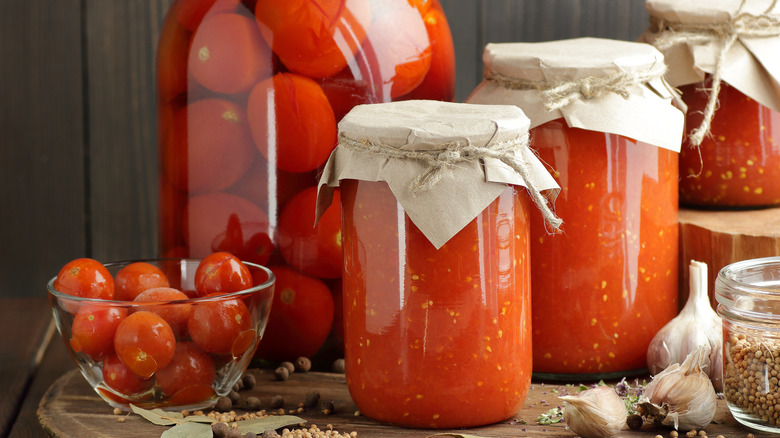Why Whole Canned Tomatoes Are Superior To Diced Or Crushed
Tomato season comes and goes, but there's a way to enjoy flavor-packed tomatoes year-round. Canned tomatoes are a pantry staple and a versatile ingredient perfect for everything from soups to taco meat to spaghetti sauce. Simple to use and full of flavor, canned tomatoes can be dumped directly into most recipes without major prep work, saving time and effort and resulting in an equally delicious finished product.
If you've spent time shopping for canned tomatoes, you'll know there's a lot of variety on the shelves. Whole, diced, puréed, seasoned or unseasoned, herbs or no herbs ... multiply that by all the different brands available, and it's hard to know what to reach for. But if you want to stock your pantry, whole canned tomatoes are the way to go.
All canned tomatoes have their merits, but whole canned tomatoes offer nutritional and practical benefits that just can't be beaten.
Whole canned tomatoes are versatile and additive-free
While it might seem easier to pick up pre-crushed or pre-diced tomatoes, there are major benefits to buying the canned ones whole. Whole canned tomatoes don't contain additives like calcium chloride, which helps diced tomatoes keep their perfectly square shape, even after cooking. For chunky salsa or rustic soups, keeping the tomatoes' shape might be fine, or even preferable. But it's not always ideal, especially when you're cooking pasta or pizza sauce, which some prefer to be velvety smooth.
Still, be sure to check the ingredient lists before buying them. Some American whole canned tomatoes contain preservatives. If you want to avoid them, your best bet is to look for Italian imports, such as the classic standard San Marzano, which usually come free of additives.
Whole canned tomatoes are also more versatile than any other variety. They can be diced, puréed, crushed, or left whole, making them perfect for stocking your pantry if you don't know what you might need in the future.
Canned tomatoes offer surprising benefits
You might expect fresh produce to be the best option, but canned vegetables and fruits have plenty of nutritional benefits.
Canned tomatoes are equally as nutritious, if not more so, than fresh tomatoes. The canning process introduces heat to the red fruit, causing it to release a substance called lycopene. Lycopene is a carotenoid, which is a natural pigment that provides the tomato's bright red color. It's also an antioxidant; ingesting lycopene may be linked to the prevention of breast and prostate cancer.
On top of that, they have a much longer shelf life than fresh ones, able to last in pantries for more than a year. Canned tomatoes are inexpensive and convenient, easy to store, and require less prep work than their fresh counterparts. There's no reason not to reach for them if the recipe calls for it — grab your can opener and enjoy.


